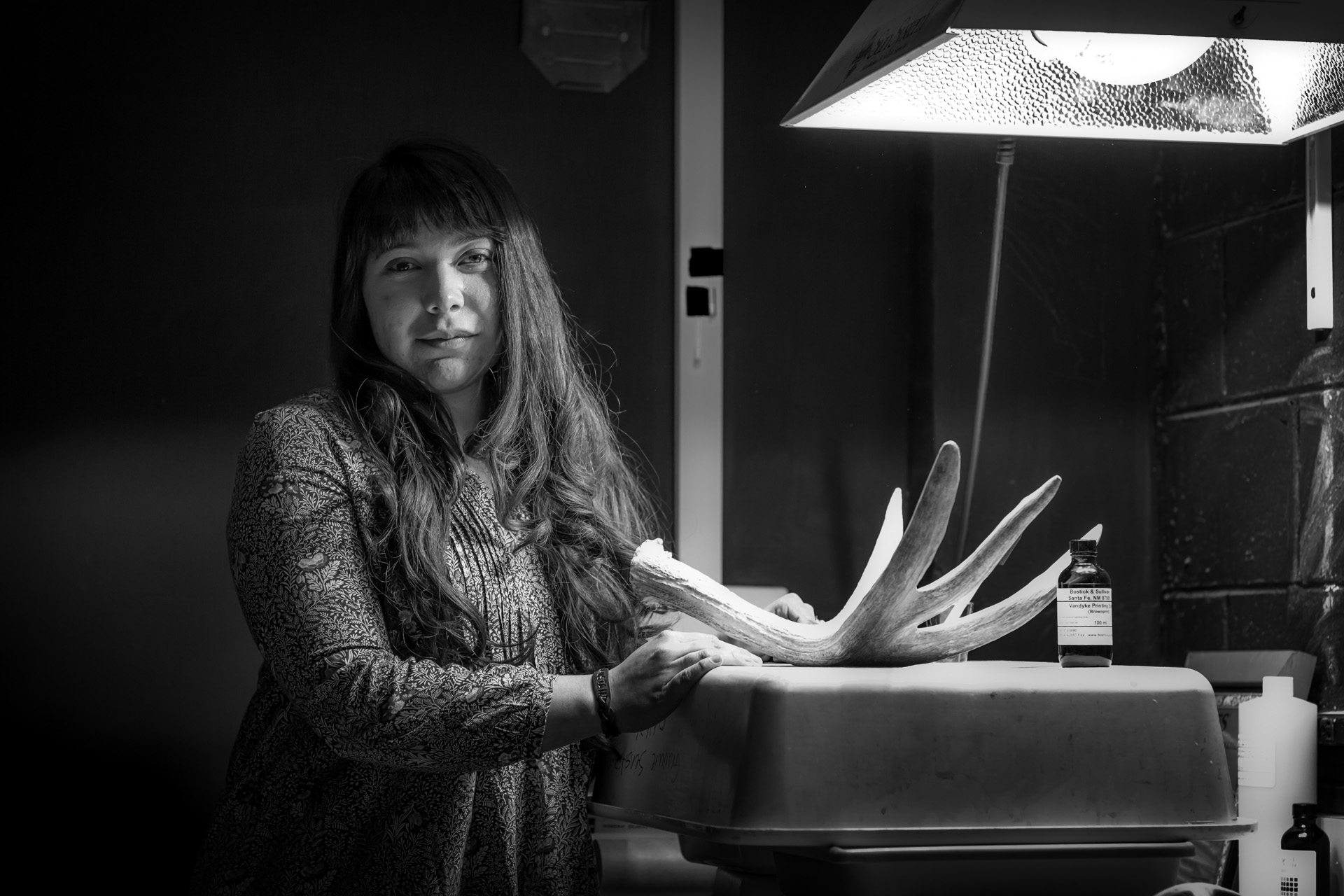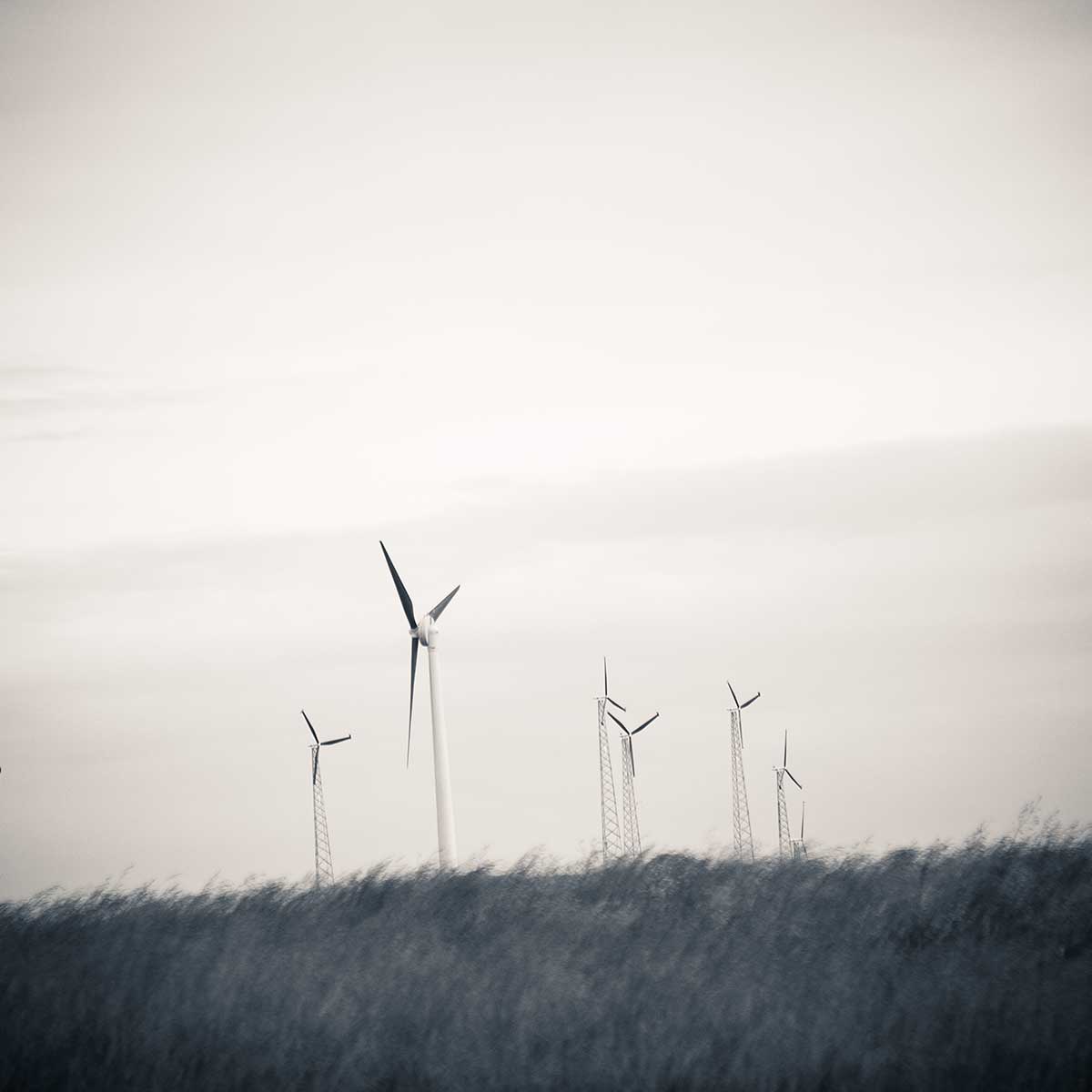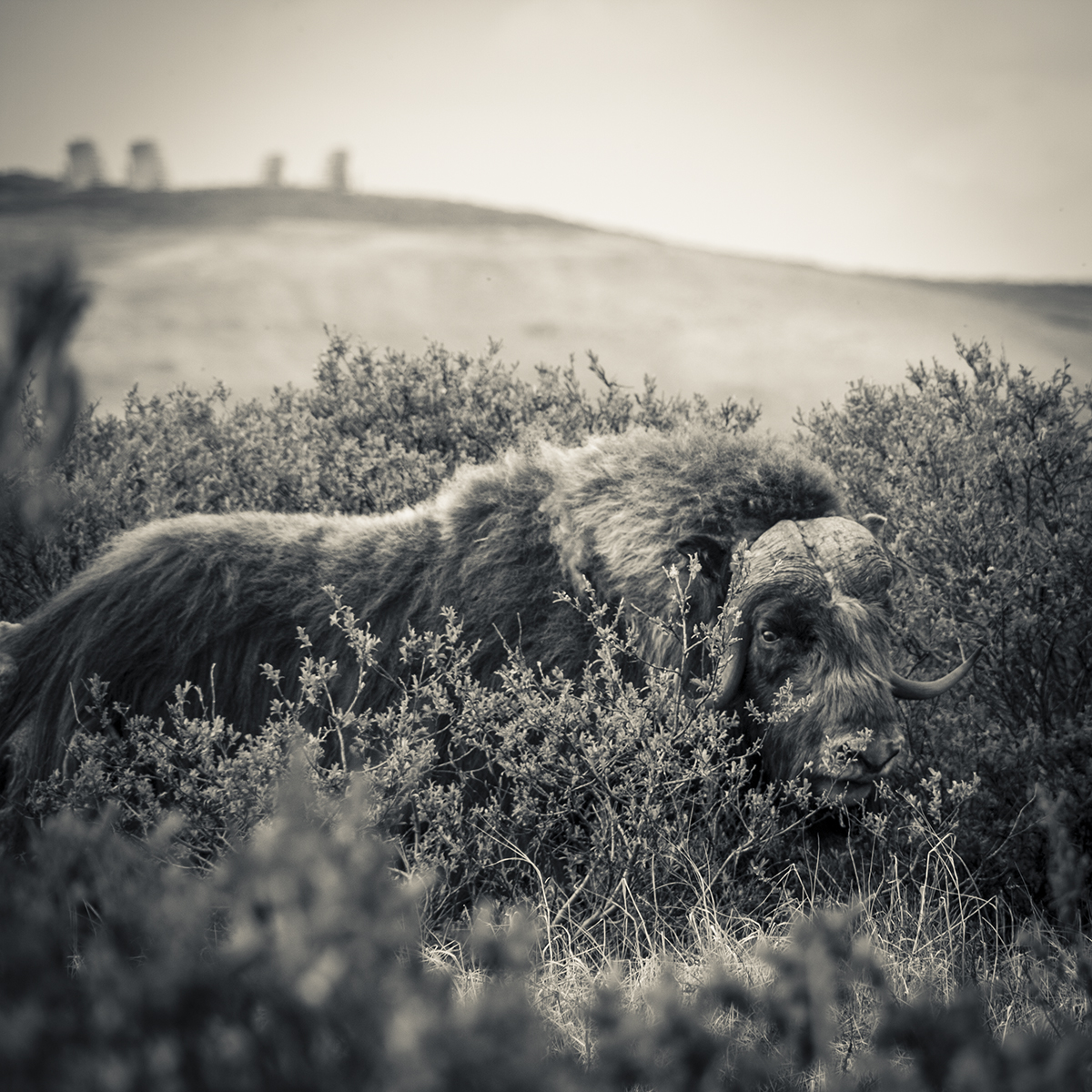Exploring quiet space
Photographer immerses herself in the Seward Peninsula
By Sam Bishop

Alyssa Enriquez leapt between worlds in 2012, from studying art photography in San Francisco to grinding rust from steel construction beams in Nome.
The impact cracked the lens through which she saw herself. She’s putting the pieces back together with a master’s degree in art photography at UAF.
“The main part of my thesis is about finding my place, not so much in Fairbanks but up in Nome,” she said. “It’s like two different worlds that you’re between.”
To find that new place, Enriquez tells stories about what has happened since she followed a friend to Nome three years ago. The stories appear through her finely crafted photographs — most of the time.
Then there was that other time. On stage. Under bright lights. With hundreds of people listening.
In November 2014, Enriquez asked to speak and read a poem at “Dark Winter Nights,” a series of live storytelling events. Rob Prince, a UAF journalism professor, created the show to talk back to the storm of fiction produced when reality television discovered Alaska.
Enriquez spoke for 10 minutes. The audience chuckled as she explained how she came to Alaska and built a new life.
“It started with a boy. It always starts with a boy,” she began.
There was much more to her story, though, and no one was laughing when she finished.
Making Nome home

Enriquez graduated from high school in Bakersfield, California, at the hot southern end of the Central Valley’s farm country. Her dad operates heavy equipment on construction projects. Her mom has “worn many hats,” she said.
Enriquez met Isaac Thompson, then a future UAF engineering student from Nome, online in 2007 — “when MSN Chat was really cool,” Enriquez said. They met in person four years later, when Thompson visited the Bay Area to investigate batteries for a student-built electric snowmachine.
The next year, Thompson passed through again, returning from studies abroad. He invited Enriquez to Nome.
“I thought, ‘Well, what’s life without taking a chance?’ And I moved here,” she said.
In Nome, she went to work in the Thompson family business. Isaac’s father, Roger, is an engineer by trade, and his mother, Cheryl, teaches at UAF’s Northwest Campus.
Enriquez helped the Thompsons level buildings.
“I shoveled lots of gravel,” she said. “Used the hydraulic hand jack a lot. Sanded 20-foot I beams.”
And fell in love. So when the month was done, she wasn’t. In fall 2012, she and Isaac Thompson moved to Fairbanks, where he attended school. Enriquez worked and took classes online that winter to finish her undergraduate degree with the Academy of Art University in San Francisco. Then it was back to Nome.
“That’s the summer I went fishing a ton, went seining, saw my first bear up close and personal,” she said. “It was munching on salmon while we were munching on salmon. It was just pretty incredible.”
Responding to tragedy

Returning to Fairbanks that fall, she visited Charles Mason, a professor who teaches photojournalism and art photography. He talked her into the MFA program starting in spring 2014.
Months later, standing on the Pioneer Park Civic Center’s stage, Enriquez shared what had happened during her third summer in Nome: Her boyfriend’s younger brother took his own life.
“I didn’t know what my place was in my Alaskan family until then,” she told the hushed audience, her voice just slightly quavering. “The only thing I knew to do was to help, and in rural Alaska there isn’t a cleanup crew when something like this happens.” So she cleaned.
In a recent interview, Enriquez explained why she went to the stage with her story.
“I was feeling very alone in that situation, because it was my loss, but it wasn’t my loss at the same time,” she said. “I don’t like feeling alone. I know other folks don’t like to feel alone, so I felt the need to tell this story for a couple of selfish reasons but also to sort of give people hope that you’re not alone when something happens.”
The story also might help people consider what can be done, “but without being so didactic,” she said. “When you storytell, you can do it in a way that is very hopeful and very empathetic, and that was my goal really.”
A quiet technique

While she enjoys writing, Enriquez has found that photographic images tell stories in ways that contrast with her own persona.
“There’s this quietness when I go out and shoot, and I think it’s reflected in my imagery — whereas you meet me and that quietness may not present itself,” she said with a laugh.
Even her printing technique is slow and quiet. For her thesis, she makes images using the platinum-palladium process, which involves coating each piece of paper with a photosensitive chemical solution.
“It’s just a much richer photograph, and I think that my work lends itself well to that process,” she said.
Enriquez also has experimented with printing on antlers and other material, using a similar technique. She uses photos of the places from which the materials came — the Seward Peninsula and Bering Sea.
Her images tell stories about her new home, the people who live there and her relationships with them.
“One of the things that most excites me about Alyssa’s work is that she’s doing a serious look at Nome,” said Mason, her professor. “Most Alaska photography in recent decades has not focused on the Bush. So it’s nice to see a serious photographer with a serious eye produce a body of work in that area.”
Enriquez said Alaska’s opportunities, whether photographic or not, intrigue her.
“You don’t often live in a place where people do extraordinary things every day, and this is definitely one of those places,” she said. “That’s most people’s Alaska story — ‘I came out here, I didn’t really know what I was doing and everything worked out.’ And my life is seemingly following the same path.”
Sam Bishop is an editor and writer with UAF Marketing and Communications.
Birdshot
By Alyssa Enriquez
The sound of birdshot rolling across the bloodstained wood floor refuses to leave my memory
Metallic iron scent lingering, even after two coats of Killz paint
Oppressive summer sun so foreign to this land, beads of sweat as my hands rhythmically scrub away bits of a person I once knew and cared for
10 hours and still I cannot bring myself to stop scrubbing
I leave only to scream, to cry, to let it sink in
I sink to the late-evening dew-soaked earth
Knees dirty and hands knowing the only thing that feels safe — help
“Did you have enough to eat?” “Here, I'll make you a sandwich”
Strangers hug, awkward words escaping while the whispers swirl
“Was it intentional?” they ask me. I am numb. “I don't know” I plead with my eyes and shrug
I barricade myself in memories, not my own
The sound of the scanner and scent of old photographs, hopeful.
I smile and laugh until I am crying
His father stands silently behind me and places a warm hand on my shoulder but I cannot turn around
I do not have adequate words to express that “I am sorry”
Sorry isn’t sufficient
The sniffles say enough and finally I turn around but he’s gone
There beside me sits a picture, a successful hunt
Pride on his face, Amos is nearly 11
And I hear the sound, birdshot rolling across the bloodstained wood floor
— From Alyssa’s webpage, October 16, 2014
